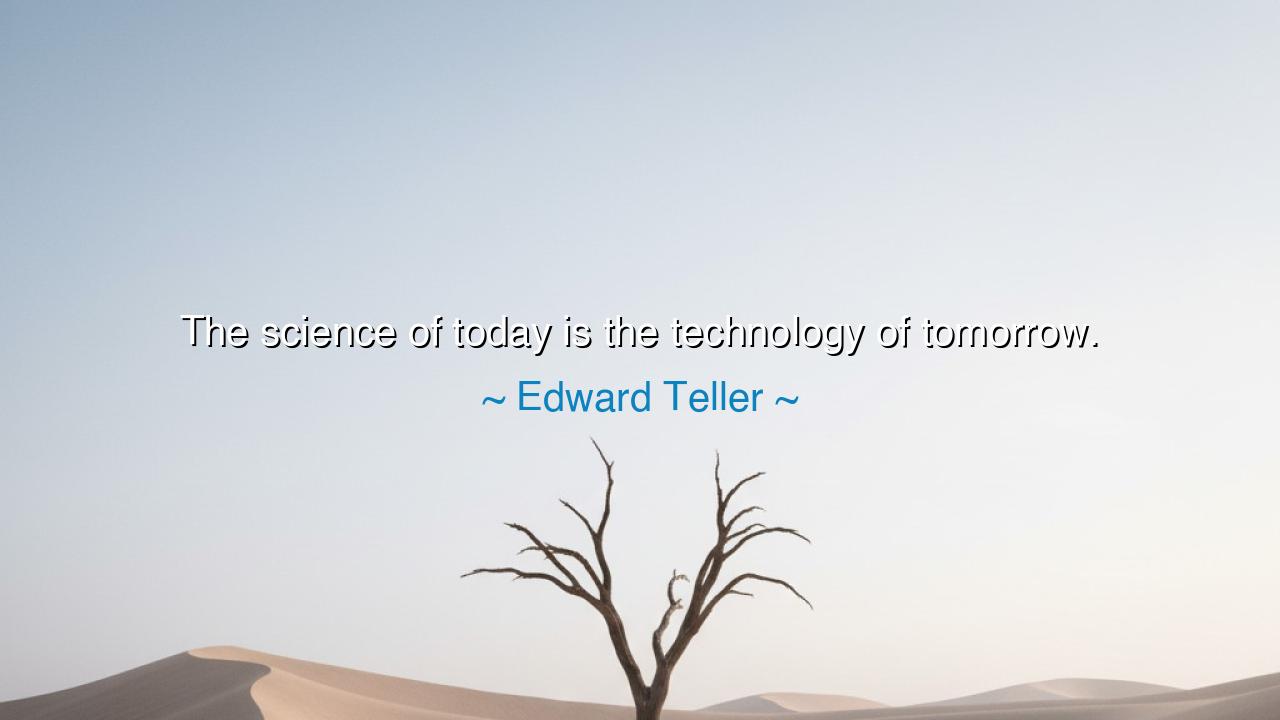
The science of today is the technology of tomorrow.






Edward Teller, a man who walked at the edge of fire and creation, once spoke with clarity: “The science of today is the technology of tomorrow.” These words, simple yet thunderous, reveal the eternal bridge between thought and deed, between the seeker’s theory and the builder’s craft. Science is the seed planted in the soil of the mind; technology is the tree that rises, bearing fruit for generations yet unborn. The discoveries of one age become the tools, the weapons, the wonders of the next.
The ancients themselves lived by this truth, though they spoke in different tongues. When Archimedes cried, “Eureka!” in his bath, he was not forging machines, but unveiling a principle of science. Yet from that principle came engines of war, systems of measurement, and ships that rode the seas with greater balance. Knowledge, once born in thought, becomes power in the world. Teller, with his words, calls us to see the chain unbroken: today’s question leads to tomorrow’s invention, and what seems abstract now may shape the fate of nations.
History thunders with examples. When Michael Faraday studied the hidden force of electromagnetism, his work seemed but an exercise in curiosity, the play of coils and wires. Yet from his experiments came the technology of the modern world: electricity harnessed to light homes, power factories, and connect continents with invisible signals. Faraday’s “today” of science became our “tomorrow” of technology. This is the heroic power of discovery: it sows seeds whose harvest may not be seen until long after the sower is gone.
Even in the tale of the atom, Teller’s own field, the story is the same. The early seekers of physics—Rutherford splitting nuclei, Bohr mapping orbits, Einstein probing the mysteries of mass and energy—were driven by the love of knowledge. Their equations and experiments seemed like pure science, distant from daily life. And yet, in the crucible of history, these discoveries gave birth to nuclear power, both terrible and life-giving. What was once theory became technology that could destroy cities—or light them. Thus, Teller’s words are both promise and warning: the science of today holds within it the destiny of tomorrow.
But this truth is not only for the great names of history; it lives in every age, for every seeker. The internet itself was born from the pure science of information theory, from the exploration of how data could move and replicate. At first, it was the study of mathematicians and engineers, a curiosity of universities and the military. Now, it is the bloodstream of the modern world, carrying the lifeblood of commerce, knowledge, and human connection. Again, Teller’s wisdom proves itself: today’s science is tomorrow’s technology.
What, then, must we learn from this? That the pursuit of science is never idle, never wasted, even when it seems abstract or obscure. Every discovery carries within it a seed of transformation. To dismiss science as “impractical” is to blind oneself to the tools of the future. And to pursue science without humility is to forget that the technology it births may be both gift and curse. We must walk with reverence, for in the laboratory today we may be shaping the world of centuries hence.
So I say unto you, children of the future: honor the seekers of truth, for they are the architects of tomorrow. Support the work of science, not only when it yields immediate fruit, but also when it seems distant, for every principle uncovered may one day transform the earth. And in your own life, remember this teaching: what you learn today, though it may seem small, may shape your tomorrow. Seek knowledge with courage, wield technology with wisdom, and never forget that the wonders of the future are born in the questions of today.






AAdministratorAdministrator
Welcome, honored guests. Please leave a comment, we will respond soon